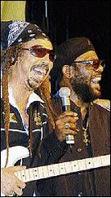Mel Cooke, Gleaner Writer 
Stephen 'Cat' Coore (left) and Bunny Ruggs, original members of Third World.
Although Marley had already made reggae huge and made his transition in 1981 the word 'Jah' was still not exactly mainstream. There was, however, one musician who not only knew the word, but the world view it is a part of.
And it was not surprising, after all, he was the person Marley was preparing to storm the United States musically with when he died.
Still, Stevie Wonder found an outlet for the 'Jah' within him, in Third World.
Stephen 'Cat' Coore, the band's guitarist, told The Sunday Gleaner that in 1981 Stevie Wonder came to Jamaica and spent four months recording, getting involved with the Happiness Unlimited band from Ocho Rios, St Ann.
Marley tribute

Stevie Wonder
They had already met Wonder in the US, where they recorded in the same facility (though in different studios). Coore said Wonder would pass the room they were in and comment that "Third World is on the one", a line that would turn up on his Marley tribute, Master Blaster (Jammin').
So, Wonder invited Third World to go back to the US to record with him; the band actually going to his house and rehearsing Jammin' to play that same night. When it was time to record, the first song Wonder came with was Playing Us Too Close.
Then a music executive said he wanted a song for his project and Try Jah Love was born.
"That song broke us in Japan," Coore said. It reached number two on the charts there and they saw the power of Try Jah Love when they first toured there in 1982. It also made high double figures on the Billboard charts in the US.
Criticism
With its near disco feel and tempo, it is not surprising that the roots reggae rockers got some criticism for Try Jah Love. But it did not come from what would probably have been the expected source, dissapointed Jamaican fans.
Coore says that "most criticism came from the white press, who were looking at reggae as culturally restrictive".
In some ways, Try Jah Love was ahead of its time in terms of tempo and fusion, but Coore points out "look what's happening now", indicating the blending of dancehall and hip-hop.
"That is what Third World came to do. We were very interested in that kind of music," Coore said.

